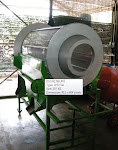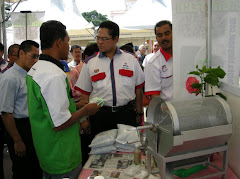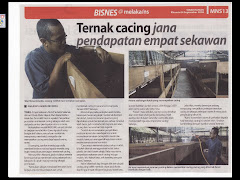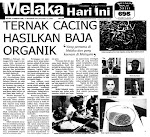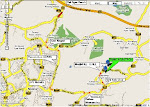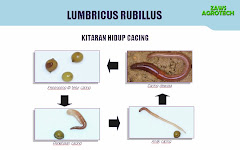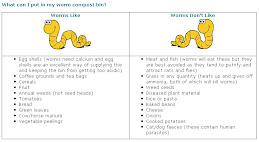

ZANNA ES learns about worm breeding for profit.
KAMARUZAMAN Dahlan, 54, had been breeding worms on his 0.8-hectare plot of land in Tanjung Darat, Banting, Selangor for the past six years.
He decided to go into worm breeding as he found difficulty sourcing for halal organic compost for his organic vegetable plot.
A former quality control manager with a Japanese firm, Kamaruzaman invested RM100,000 on his farm. When he started, the worms were imported from Australia and Indonesia.
He is able to breed a tonne of worms monthly, which produces 40 tonnes of organic fertiliser in pellet, powdered and liquid form daily for the local market.
He also produces organic fish and poultry meal from the castings.
Kamaruzaman, who runs ParkMan Agro, has exported the fertilisers to Japan as well as Korea.
Organic fertilisers, he says, has at least 17 nutrients, compared to only three in urea fertilisers.
Although it may cost slightly more, in the long run, it is more economical than urea fertiliser.
Padi farmers in Sungei Sireh (close to Sekinchan) have reported higher yields after using the organic fertiliser.
If they were only producing about 7 tonnes per hectare, their yields have risen to 10 tonnes of padi per hectare.
He hopes to set up a fertiliser manufacturing plant in the near future, but this would require an enormous amount of worms.
He is currently not only supplying worms to AZR Agro Centre in Olak Lempit, Banting (which is currently breeding worms on a commercial scale), but also to the Selangor Agriculture Department.
Going back to nature via breeding worms to produce organic fertilisers is in line with the State agricultural department's objective to slowly phase out dependence on chemical fertilisers, says AZR's Agro Centre CEO Mustafa Abdul Wahab.
AZR Agro Centre, which has been breeding worms commercially for more than a year, says the worms are bred as livestock as well as for the castings which are made into organic fertilisers. Plans are also afoot to produce poultry feed.
Company managing director Azlinda Ros Abdul Aziz says that they too had to initially import the worms from Bandung, Indonesia. They had invested RM50,000 on the less than a hectare of land to breed the worms in 30 boxes, stacked like double-decker beds.
Azlinda, who is a USM graduate in Environmental Biology, says studies show that the worms are 80 per cent a better source of protein than soya bean.
In developed countries, proteins sourced from worms have been manufactured into protein tablets and in instances, form part of the diet. Powdered worm protein are used in skincare as well as pharmaceutical products.
There are four types of worms locally available: the red worms, tiger worms, blue worms and the African night crawlers. The centre prefers the red worms because they are easier to breed and multiply fast.
“Some of the worms are too active and tend to go astray,” she says.
The worms feed on compost, which also forms their bedding. They can be fed on high proteins derived from soya bean residue but these will turn sour if not totally consumed. The worms also require suitable bedding for maximum production.
“The compost which forms their bedding has to be damp and cold,” says the 32-year-old. The first production only begins after six months.
Currently they sell livestock to local pharmaceutical companies which will extract the protein.
The protein extracts are also provided upon request in powder or liquid form but are processed in Indonesia before they are brought in again to be sold.
"We don't have the facilities and the technology yet to do it locally," says Azlinda.
Although they do have plans to bring in the technology and to set up the factory on four acres of land behind the breeding shed, the main issue has to be settled before moving on to providing such facilities. "There has to be enough livestock," she adds.
"To produce one litre of the protein extract would require at least 10 tonnes of worms," explains Azlinda. Currently the company is producing 50kg of livestock worms and only one tonne of fertilisers monthly. One company alone is asking for a supply of at least a few hundred kilogrammes of fertilisers.
“Producing 50kg is a very small production and definitely insufficient to meet the growing local demand,” says the managing director.
There is always potential in worm breeding because the demand is there.
Their project has caught the attention of Muda Agricultural Development Authority (Mada) and the Perak State government which plans to encourage worm breeding for fertiliser production.
“People need not worry about having mega funds to start their own worm breeding,” says Mustafa.
“They can start on a small scale breeding worms in their own backyard,” encourages Mustafa.
Banks such as Bank Pertanian have allocated loans for agricultural projects. With RM1,000, one can purchase two kilogrammes of worms and they can breed them in any container be it plastic pails, baskets or even lockers.
The company will be organising another worm breeding seminar on March 1 to help individuals who are interested in generating income though worm breeding.
Mustafa says that they encourage such breeders to become vendors, where the company will not only guide them in successful breeding but will also buy back the worms.
“This means they do not have to worry about finding a market,” explains Mustafa.
What it also means is that it is not only a good income source, especially for single parents. At the same time, the venture helps worm production for the company.
The company has 40 vendors from Selangor, Negri Sembilan, Malacca and Johor. They hope to have a branch in each State where they would each have their own distribution and collection centre. Once the manufacturing plant is set up, the current shed would be used to store the worms purchased.
The company also naturally breeds 150kg of eels in the ponds close by, which is similar to its natural home. The eels are sold live to be made into gourmet dishes or sold to breeders. The company also breeds another 50kg of leeches in man-made ponds Meru, Klang.
“Eels and leeches are often used in pharmaceutical products,” says Azlinda.

